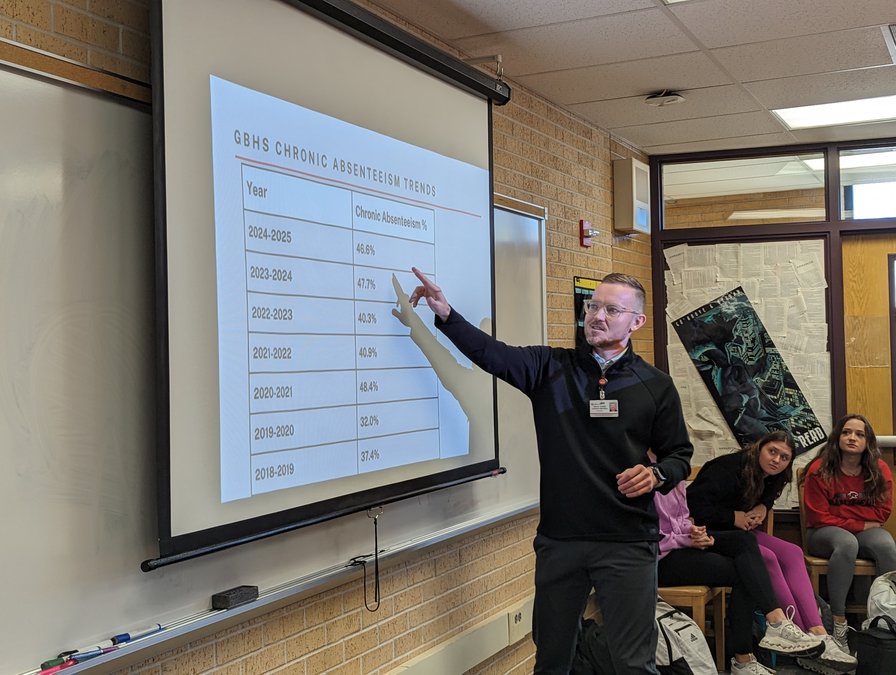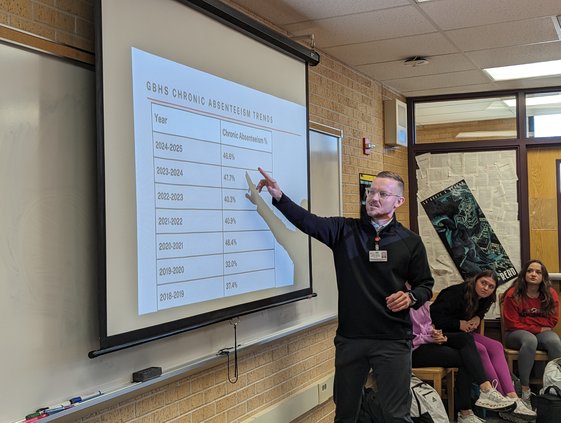Great Bend High School Principal Brock Funke started this school year with a goal to reduce chronic absenteeism by 5%.
Last week, Funke reported that absenteeism at GBHS was 46.6% for the 2024-2025 school year, compared to 47.7% in 2023-2024. At the end of this school year, administrators will know whether policies put in place this year have helped.
Communication with students and families has “improved dramatically,” he said, adding students are being made aware of what is expected of them.
After a certain number of absences, families are sent warning letters.
Examples of excused absences include illness, funeral, medical appointments, obligatory religious observances, absences prearranged and approved by the principal, and absences for “other reasons,” which in the principal’s judgment are reasonable and necessary. After three consecutive days of illness, written documentation from a doctor is required. After a medical appointment, a doctor’s note upon return to school is required.
Funke also reported on this topic when the school board met at GBHS back in February. Strategies for improvement included an awareness campaign and adding a new attendance explanation to the Student Handbook that calls for greater student accountability. Students would need to earn the right to enjoy certain privileges, such as enrolling in an internship or attending Hollyball, through their responsible attendance. The school will also recognize and reward good attendance.
Chronic absenteeism includes all absences, whether excused or unexcused. Missing 10% or more of the school days in a year is considered “chronic.”
According to the GBHS student handbook, students are either “present” or “absent.” The specific reason for the student’s absence are noted. Examples of “present” are being in class, at a college visit, at a school-sponsored activity or at a school-related activity.
Students are allowed up to 16 days of absences, excused or unexcused, for the entire school year. If a student misses eight or more school days during the first semester, they will not be allowed to attend Hollyball, participate in internships, do job shadowing or leave school to attend Barton Community College classes virtually or on campus during school hours. Any absences beyond 16 days will result in having to attend summer school and those students won’t be allowed to attend prom. Some consequences will carry forward to the following fall.
Incentives
Students who miss fewer than six days will be exempt from midterns at the end of the first semester, and those who miss fewer than 14 days for the year will be exempt from finals at the end of the school year, unless they are failing a class.
Test scores
Also tied to the push for better school attendance is a goal to improve scores on state assessment tests.
“We’re six to seven points behind that state average,” he said.
Again, communication may be the key to success. Funke said educators are inviting students to the discussion table. One idea is to look into recognition and rewards. This is something GBHS Hall of Famers such as Ty Cobb and others have expressed interest in helping with.
“If kids know the reason it’s important, they’re going to perform. We want their feedback,” Funke said. The educators’ message to students needs to be, “We do believe in you – you can succeed on that test.”





